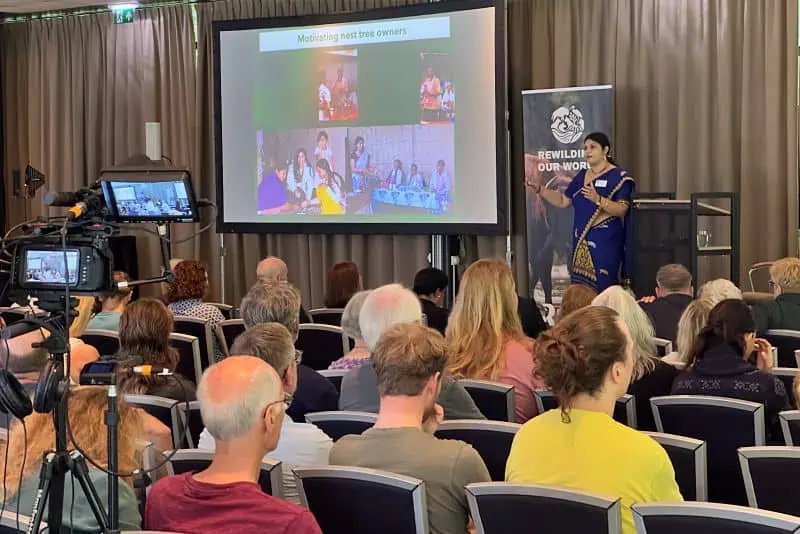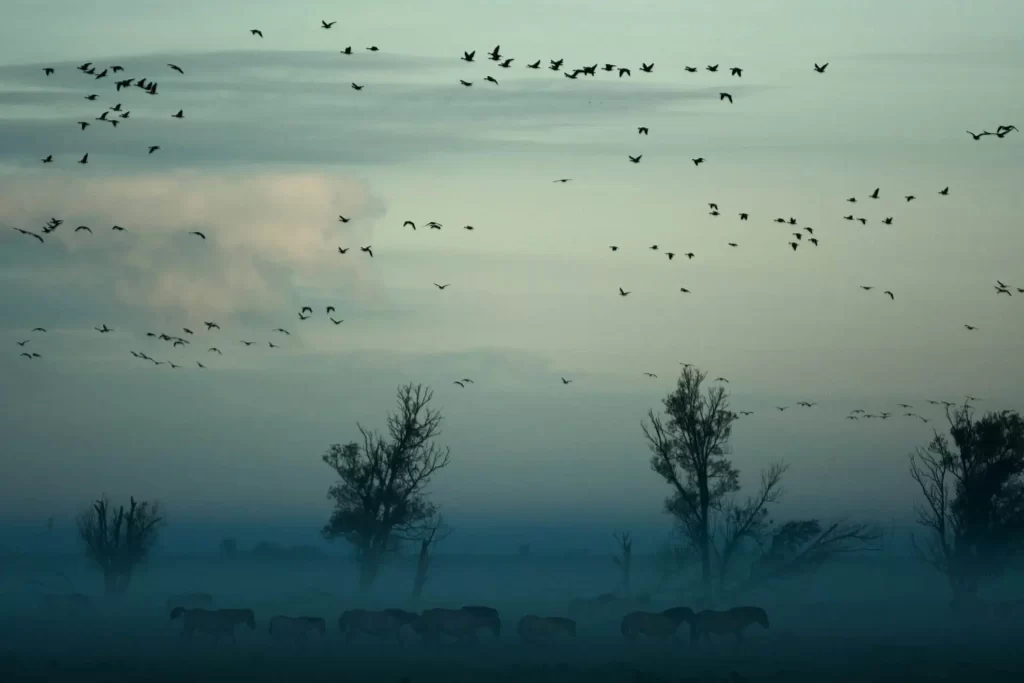Share:
Global Rewilding Awards Celebrate Pioneers at Rewilding Our World 2025
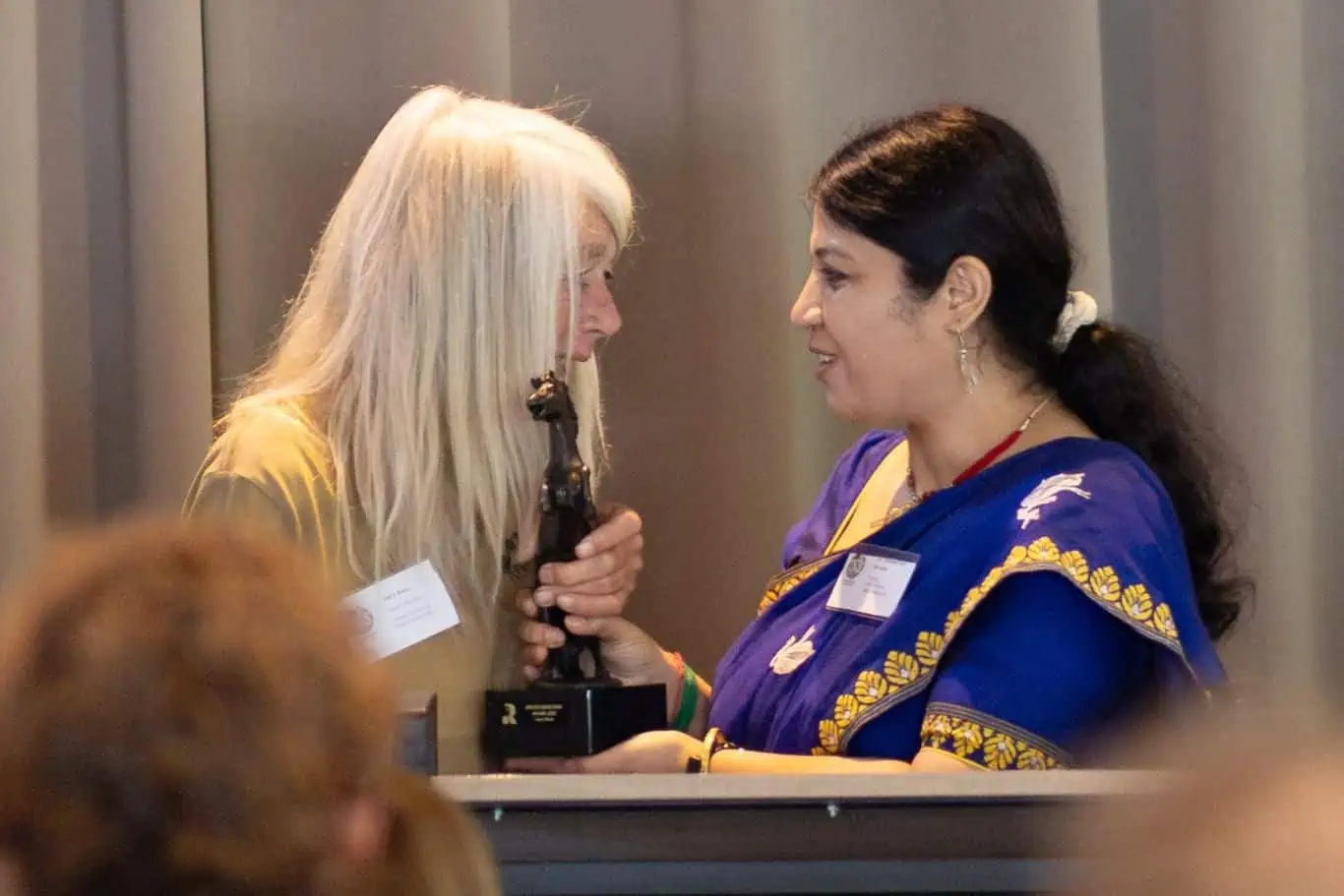
Wolfheze, Netherlands — The opening day of the Rewilding Our World 2025 conference was a landmark moment for the global rewilding movement, as the Rewilding Academy honoured three exceptional individuals for their extraordinary contributions to restoring wild nature.
The Global Rewilding Awards recognized pioneers across three categories: the Rewilding Pioneer Award went to Frans Vera, the Rewilding Legacy Award to Sir Humphry Wakefield, and the Species Rewilding Award to Lucy Rees. Each recipient represents a unique dimension of rewilding — from shaping landscapes and protecting iconic species, to demonstrating how animals themselves can drive ecosystem recovery.
Rewilding Pioneer Award – Frans Vera
Frans Vera has profoundly transformed how we perceive Europe’s landscapes. The Dutch ecologist, best known for his work at the Oostvaardersplassen, championed the role of large herbivores as architects of dynamic ecosystems. His “wood-pasture hypothesis” challenged long-held assumptions that Europe’s pre-agricultural landscapes were continuous forests, proposing instead a mosaic of grasslands, scrub, and woodlands actively maintained by grazers like deer, horses, and cattle.
Vera’s groundbreaking ideas, presented in Grazing Ecology and Forest History, laid the conceptual foundation for rewilding projects across Europe, inspiring generations of conservationists and helping shift the focus from static management to processes-driven ecological restoration. At Oostvaardersplassen, his vision became a living experiment — a bold demonstration of how letting nature lead can restore biodiversity and landscape complexity.
 Frans Vera
Frans Vera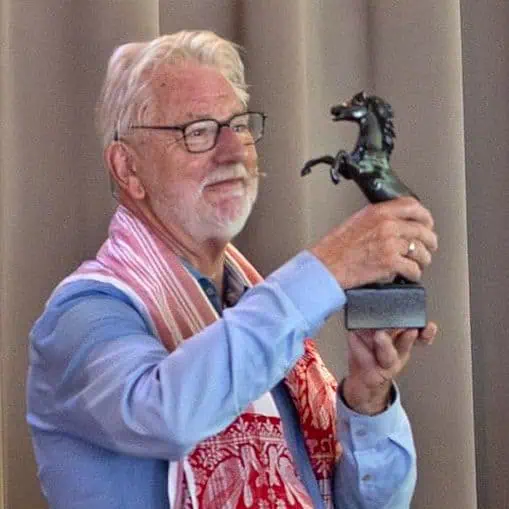 Frans Vera received the Rewilding Pioneer Award at the Rewilding our World Conference 2025
Frans Vera received the Rewilding Pioneer Award at the Rewilding our World Conference 2025
“Frans Vera changed the way we understand wild nature,” remarked Michele Robson, chair of the Rewilding Academy communications, at the award ceremony. “He showed that landscapes are living systems shaped by species and natural processes — not static museums.”
Rewilding Legacy Award – Sir Humphry Wakefield
Sir Humphry Wakefield embodies the stewardship, dedication, and adventurous spirit that underpin the rewilding ethos. As custodian of Chillingham Castle in Northumberland, he has protected the wild Chillingham cattle, preserving one of the last truly untamed herds in Europe. Beyond this, Sir Humphry has contributed to global conservation through roles with the Wilderness Foundation, the Tree of Life Foundation, and by supporting pioneering reforestation projects in North Africa.
 Lucy Rees honours Sir Humphry Wakefield with the Rewilding Legacy Award (Photo: Arend de Haas)
Lucy Rees honours Sir Humphry Wakefield with the Rewilding Legacy Award (Photo: Arend de Haas)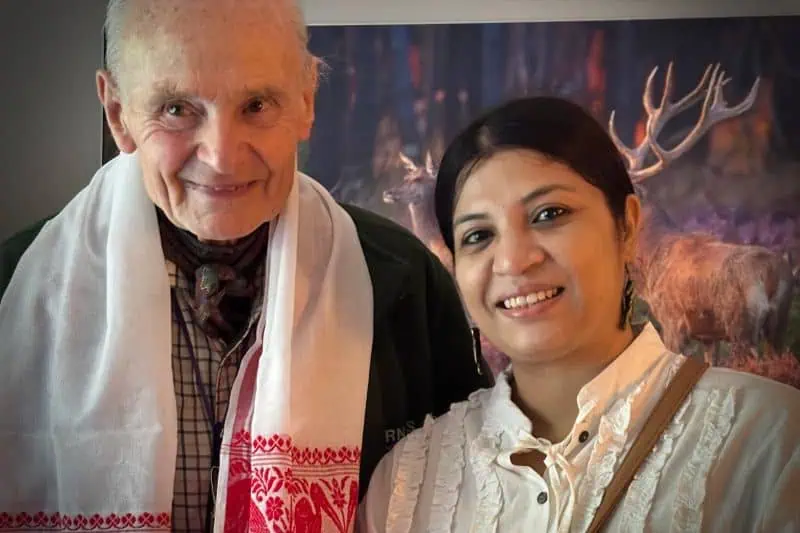 Sir Humphry Wakefield and Purnima Devi Barman (Photo: Arend de Haas)
Sir Humphry Wakefield and Purnima Devi Barman (Photo: Arend de Haas)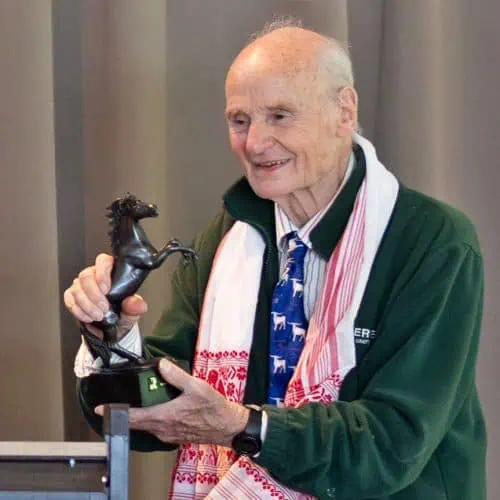 Sir Humphry Wakefield honoured with the Rewilding Legacy Award (Photo: Arend de Haas)
Sir Humphry Wakefield honoured with the Rewilding Legacy Award (Photo: Arend de Haas)
His life of exploration — from Antarctic expeditions to Himalayan climbs — reflects a philosophy that combines curiosity, courage, and care for the natural world. “Rewilding is not about turning back the clock,” he said, “but about restoring the pulse of life and the rhythms that connect us to the land.” His dedication has inspired countless individuals to engage with rewilding, blending heritage, science, and imagination in the service of nature.
Species Rewilding Award – Lucy Rees
Lucy Rees has shown that animals themselves are powerful agents of ecological renewal. An equine ethologist and field researcher, Lucy works with wild and semi-wild horses in Spain’s Extremadura region, studying how their natural behaviours — grazing, trampling, and movement — actively shape landscapes.
Through her Pottoka in Piornal Project, Lucy Rees has demonstrated how free-roaming horses can maintain open habitats, encourage biodiversity, and restore degraded ecosystems. Her publications, including The Horse’s Mind and Wild Horse Ethology, bridge science, practice, and empathy for wild animals, highlighting the critical role species play in the rewilding process.
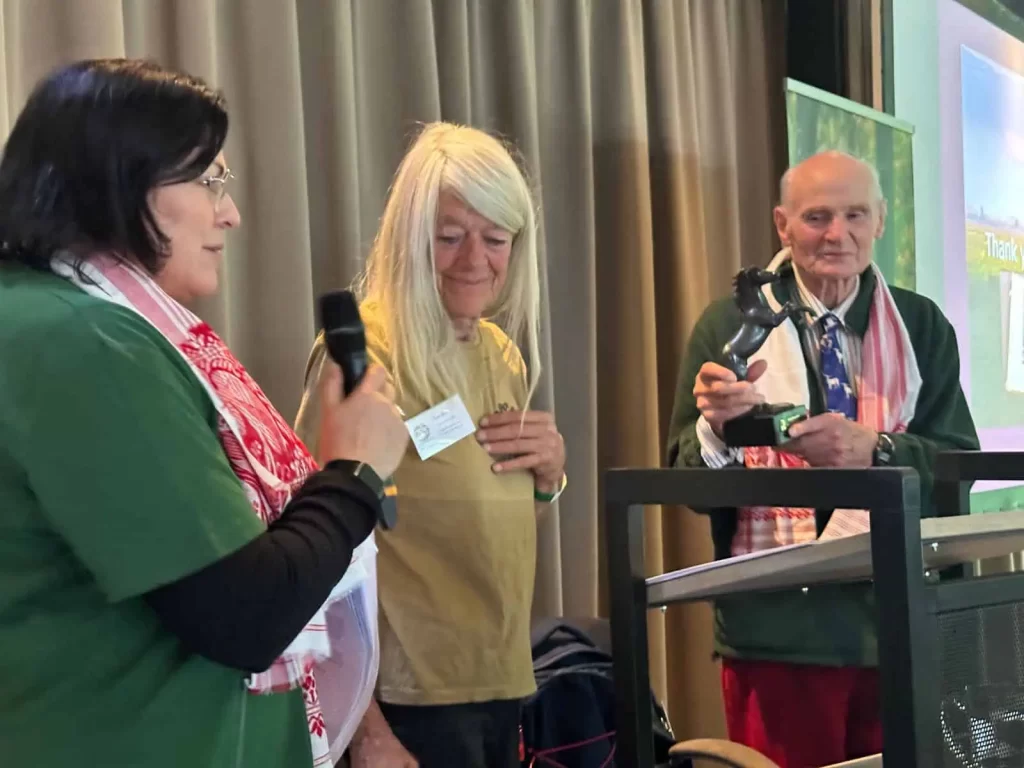 Michele Robson, Lucy Rees and Purnima Devi Barman
Michele Robson, Lucy Rees and Purnima Devi Barman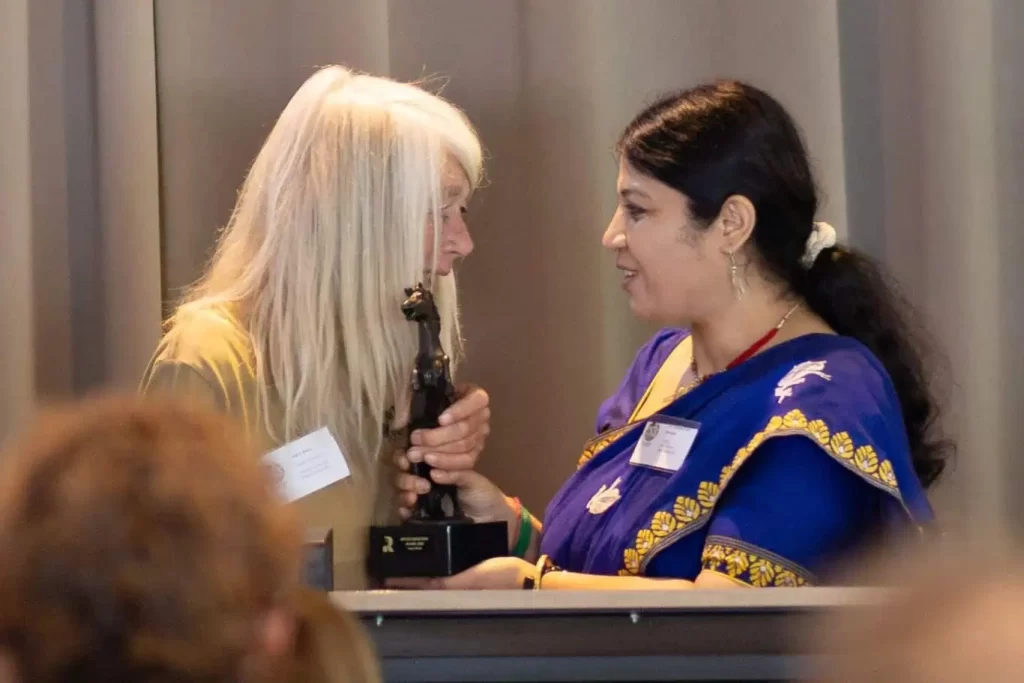 Lucy Rees and Purnima Devi Barman
Lucy Rees and Purnima Devi Barman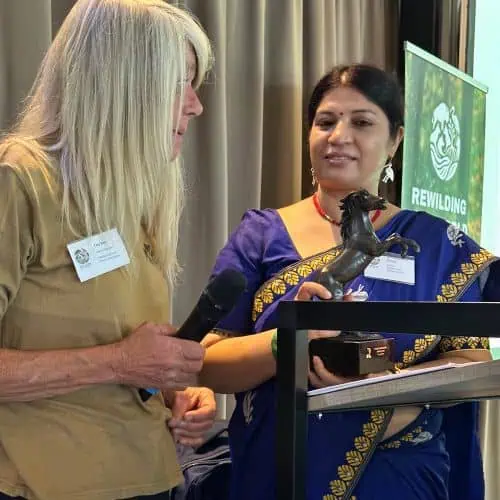 Lucy Rees and Purnima Devi Barman
Lucy Rees and Purnima Devi Barman
“Lucy Rees reminds us that true rewilding respects animals as partners in ecological recovery,” the award citation noted. “Her work exemplifies how understanding animal behaviour can restore both land and life.”
a Movement of Hope
The Global Rewilding Awards highlight the diversity of approaches and philosophies driving the rewilding movement. Frans Vera reframed ecological theory; Sir Humphry Wakefield embodied stewardship and inspiration; and Lucy Rees connected human understanding to the agency of wild species. Together, their achievements demonstrate that rewilding is not just a scientific practice — it is a movement of hope, vision, and cultural renewal.
“Rewilding is about restoring hope,” said Arend de Haas, Director of Ecosystem Restoration at the Rewilding Academy. “These three individuals have each, in their own way, helped restore that hope — for nature, and for all of us.”

